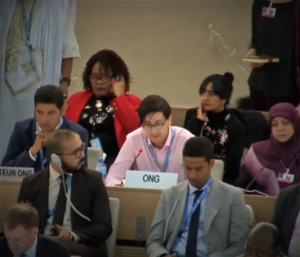This morning at the UN Human Rights Council, IHEU representative, Kacem El Ghazzali, called on his country of birth, Morocco, to grant freedom of religion or belief to all its citizens, “not just those fortunate enough to agree with the religious beliefs of the state they live in.”
Speaking during the outcome discussions of the Universal Periodic Review (UPR) of Morocco, on behalf of the International Humanist and Ethical Union (IHEU), El Ghazzali praised the kingdom for the progress it is making in the area of education and extremism; but also raised serious concerns about Morocco’s nti-blasphemy laws and the victimisation of free-thinkers and the non-religious in the country.

Kacem El Ghazzali delivers a statement on Morocco at the UN Human Rights Council
He noted that since the publication of a fatwa calling for the murder or execution of apostates, the non-religious have become an increasingly visibly persecuted belief group and suffer from stigmatisation, violence and investigation.
He urged Morocco to repeal all laws discriminating on the grounds of religion or belief “in order to comply with international human rights standards and genuinely promote tolerance and plurality in the kingdom.”
Born in Morocco, El Ghazzali was forced to flee his home country after classmates discovered he kept a blog about atheism in which he openly declared himself to be a nonbeliever, he was harassed – verbally as well as physically – and threatened with death. These threats were echoed by a public school teacher, who told students that he was an apostate atheist and said that he should be punished according to Islamic law – in other words, killed. He was taken from his home at night for interrogation by people who identified themselves as secret policemen. School authorities not only failed to intervene but also blamed him for his ideas and for having made them public. He obtained political asylum in Switzerland in 2011.
After delivering the statement, El Ghazzali commented,
“Seven years ago I was forced to leave Morocco because of my non-belief; today I am deeply saddened that the situation remains grave for those with no religion or who do not believe in the state religion.
“I delivered my statement today in the presence of the Moroccan minister of human rights from the Islamic party of development and justice. Only in the human rights council, we can speak out and make our voices heard, even to those who deny our rights.”
The statement follows in full below:
ORAL STATEMENT
International Humanist and Ethical UnionUN Human Rights Council, 36th Session (11 September – 29 September 2017)
UPR Outcomes: MoroccoKacem El Ghazzali
We were extremely disappointed to read of Morocco’s partial rejection of Kenya’s recommendation that Morocco: “Remove restrictive practices against Christians and other minorities, including limitations on religious activities, freedom of thought and conscience.” Notably it was the only recommendation regarding the right to freedom of religion or belief.
Such reform is sorely needed; the state maintains a law prohibiting expression deemed critical of “Islam, the institution of the monarchy,” and several “blasphemy” laws bearing the threat of punishment for apostates.
In the past year, the government have reportedly arrested, detained, and questioned local non-Muslims about their beliefs and authorities arrested and sentenced several individuals for eating and smoking in public during Ramadan.
Since the campaign against such fasting laws in 2009, and the publication of a fatwa calling for the murder or execution of apostates, the non-religious have become an increasingly visibly persecuted belief group. Suffering from stigmatisation, activists report cases of violence by family members, investigation by authorities, and general difficulties in educational, professional and social life.
Whilst we welcome the King’s instruction to the minister of endowments and Islamic affairs and the minister of education to review and rewrite religious textbooks and religious curricula used in public and private schools, with the stated goal of removing any extremist or intolerant references and promoting moderation, tolerance, and coexistence. We believe that the kingdom needs to do more to promote the right to freedom of religion or belief and plurality of opinions.
A state should grant freedom of religion to all its citizens and not just those fortunate enough to agree with the religious beliefs of the state they live in. We urge Morocco to consider this and put in place moves to repeal its laws discriminating on the grounds of religion or belief in order to comply with international human rights standards and genuinely promote tolerance and plurality in the kingdom.